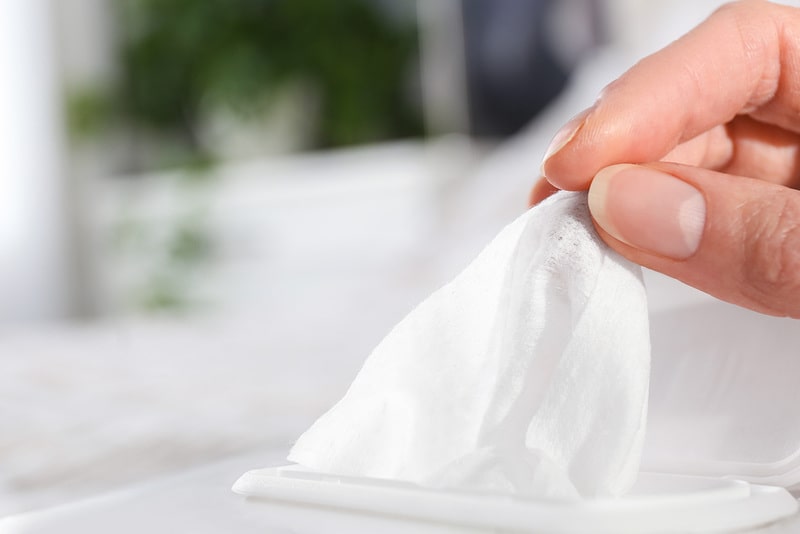There are many ways to clean up after using the bathroom, but should you use wet wipes after pooping? In the article below, we’ll look at the problem of using wet wipes after going to the bathroom and how to do it correctly for maximum efficiency.
See more: 10 Best Wet Wipes With Good Price for Baby & Adult Health
1. Which complications can happen from poor wiping?
Wiping after having a bowel movement is important to maintain good hygiene, as it removes potentially harmful fecal matter from the anal canal. For women, not wiping away all fecal matter can increase the risk of conditions such as labial irritation, urinary tract infection (UTI), and vaginitis. Men can face similar issues, including UTIs, itching, and general discomfort.
Learn more: Can wet wipes cause irritation? The truth you need to know
2. Should you use wet wipes after pooping?
The answer to “Should you use wet wipes after pooping?” is yes. Wet wipes can help reduce irritation and improve your comfort level more than dry paper, as long as you choose quality products with smooth fabric surfaces for sensitive skin.

Read now:
- Can you use antibacterial wet wipes on your bum?
- The Ultimate Guide To Finding How Many Wet Wipes Do You Need
3. How to wipe
After you have answered the question “Should you use wet wipes after pooping?” You need to know how to use them properly. Here are some critical notes on using wet wipes in the process of using them after pooping.
3.1 Use wet wipes
Wet wipes help clean your skin after using dry toilet paper. However, you should use only unscented and sensitive skin-friendly products. If you use these products, do not flush them down the toilet as they can clog plumbing.
3.2 Follow the direction
Always wipe from front to back after using the toilet so that you don’t introduce bacteria into your urethra.
3.3 Clean with a bidet or rinse bottle
A bidet is a small basin with a faucet and a nozzle that allows the water to flow upward. Squeezing a rinse bottle from the front should cause the water to flow backward.
3.4 Avoid wiping aggressively or excessively
Your rectum may become irritated by excessive or vigorous wiping. Instead of wiping too much or too hard, try rinsing the area with warm water. Consider using a bidet attachment or rinse bottle to accomplish this task.
3.5 Wear an incontinence pad
Incontinence pads can help keep you clean and dry if you have repeated episodes of stool leakage. The pad can absorb some of the stool and keep it from soiling your underwear.
Discover now: Can you wipe with antibacterial wipes? 10 common mistakes!
4. Other tips for cleaning
In addition to using a more effective wiping method, you can also take the following steps to address some of the underlying causes that make it difficult for you to wipe effectively:
- It can be helpful to take a bath after a bowel movement to reduce inflammation in the rectal area. Itching and irritation will be lessened by doing this.
- If you are experiencing constipation, increase your fiber intake to relieve discomfort. Whole grains, fruits, and vegetables are excellent sources of fiber.
- Increase your fluid intake and fiber intake to make stools softer, bulkier, and easier to pass.
- Over-the-counter (OTC) stool softeners can relieve straining during a bowel movement, which can worsen hemorrhoids.
As with any endeavor, there are some things to avoid as well. These include the following:
- Avoid using lotions, toilet paper, or soaps with fragrances in the rectal area. They can be irritating.
- Avoid foods and drinks that irritate your digestive tract, which can lead to diarrhea. Common triggers include spicy foods, caffeine-containing drinks like coffee and tea, onions and sugar substitutes.

Talk with your doctor about methods other than nasal strips to avoid irritation and discomfort.
Explore more: Can wet wipes cause hemorrhoids? Here’s the truth
5. When should you see a doctor?
Seek immediate medical attention if you experience severe pain related to bowel movements or unexplained bleeding. This may give the impression that your stool is red or has coffee grounds for texture. Bleeding could indicate several severe conditions, such as gastrointestinal (GI) bleeding; an anal fistula, which is an abnormal passageway between an artery and a vein or between two veins; and severe hemorrhoids, which are swollen veins just outside your anus that cause bleeding and pain when they’re irritated by hard stool.

If over-the-counter treatments for bowel and wiping problems aren’t working for you, talk with your doctor about other options. They may prescribe or recommend treatment such as:
- Bowel training involves self-regulating bowel movements at a specific time each day. It might make fecal incontinence less likely.
- A pelvic floor therapist can help you perform pelvic floor exercises to strengthen your muscles. These exercises may help reduce the likelihood of fecal incontinence.
- Prescription medications may help reduce diarrhea or other symptoms such as Crohn’s disease, irritable bowel syndrome (IBS), and ulcerative colitis. If constipation is the underlying cause, they may temporarily prescribe laxatives or stool softeners.
- Surgery is sometimes recommended if over-the-counter or prescription treatments fail to reduce severe leakage.
Should you use wet wipes after pooping? The answer is yes. Wet wipes can be used after defecation to provide more cleaning and health protection than dry paper. However, it is necessary to pay attention to how they are used and cleaned to avoid additional diseases that may occur. If you have any questions, please contact us for a free consultation.
Dong Hiep Trading and Investment Joint Stock Company:
- Representative office: 69B Thuy Khue, Thuy Khue Ward, Tay Ho District, Ha Noi City.
- Manufacturing site: Lot CN7, Tu Liem Industrial Cluster, Minh Khai Ward, Bac Tu Liem District, Ha Noi City.
- Hotline: (84-24) 3716 0270.
- Website: https://dhti.vn/en/
Find out more about wet wipes:
- 9 harmful ingredients in wet wipes & Label reading guide (latest updated)
- “Can wet wipes cause diaper rash?” – All things you need to know




